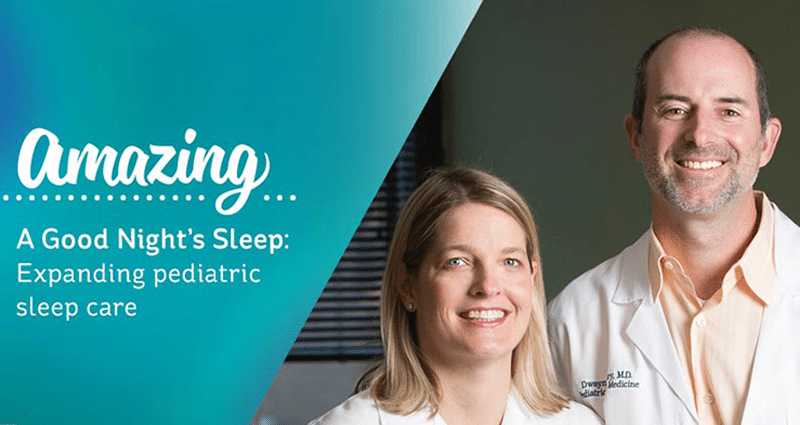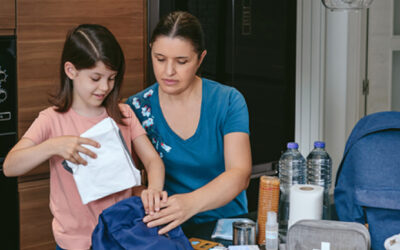To remain healthy, your child needs to get adequate sleep—restful, uninterrupted sleep.
“The two biggest goals for sleep medicine are to make sure kids get enough sleep for their age, and to make sure it’s good sleep,” explains Dwayne Henry, MD, pediatric sleep medicine specialist at Our Lady of the Lake Children’s Hospital.
Dr. Henry and his fellow pulmonology specialists, including Jessica Brown, DO, MPH, are providing state-of-the-art sleep medicine to Louisiana’s children.
Dr. Brown and Dr. Henry know each other well: they are husband and wife. Dr. Henry has been director of pediatric sleep medicine since November 2014.
“We definitely bounce ideas off each other,” says Dr. Brown. “Especially with atypical patients, we run ideas by each other, as we do with our other colleagues. It’s a great collaboration.”
In addition to treating patients at Our Lady of the Lake Children’s Hospital in Baton Rouge, Dr. Brown has started to see patients in the satellite clinic in Lafayette.
Sleep medicine began to grow as a specialty in the early 1980s, Dr. Henry says. At first pulmonologists provided care for sleep disorders, but since then the number of specialists has been growing; however, that growth has occurred only in the last 10–15 years.
Most children referred to the sleep clinic are either overly sleepy during the day, or they’re unable to fall asleep at night. Most are diagnosed with either obstructive sleep apnea—interrupted or difficulty sleeping—or insomnia.
But what surprises many parents, Dr. Henry says, is that most sleep disorders aren’t medical in nature. Rather, they are behavioral—and it’s often the behavior of the parents.
“Kids sleep how their parents teach them to sleep,” says Dr. Henry.
Poor habits such as staying up watching TV, watching TV in bed, and eating in bed all disrupt sleep, and children usually pick up such habits from their parents.
“This is tough to say, but it’s usually not a child’s problem; it’s usually a parental guidance thing,” Dr. Henry says. “We educate parents to help them understand the importance of modeling and encouraging healthy sleep behaviors.”
Something else that surprises parents: medications are not used to treat sleep disorders in pediatric patients.
“A lot of parents come in expecting medication will be prescribed for their child,” Dr. Henry says. “The majority of the time for the child with insomnia, it is behavioral or something disrupting the sleep. The goal is fixing whatever that is, or instructing the parent how to help the child get more and better quality sleep. This can also prevent some of the bad things that happen during the day, such as falling asleep and not being able to retain what they learn.”
Primary care physicians usually refer patients to the sleep clinic, where they are evaluated through interviews with the doctors. Depending on the symptoms, they may be sent for a sleep study during which they spend a night in the clinic while being monitored and observed.
But in many cases, the remedy is behavior modification, including going to bed at consistently earlier times and other tactics.
The good news, Dr. Brown says, is that parents can make a real difference for their children by becoming aware of the family’s sleep habits and then establishing and sticking to a routine.
“Sleep is a behavior, and with training it can get better,” Dr. Brown says. “It can take time to modify and change that behavior, and it’s important to stick to these routines and basics. It will get better.”
Help Your Child Sleep Better
- No electronics in the bedroom
- No electronics or TV two hours before bedtime
- Limit extra-curricular activity so they get to bed consistently on time
- No caffeine or sodas in the evening
- Set good examples such as not staying up late to watch TV, not watching TV in bed, and keeping a consistent sleep schedule
Poor Sleep Presents Itself in Many Ways
In Young Children:
- ADD/ADHD-type symptoms
- Irritability
- Hyperactivity
- Difficulty controlling impulses
- Poor learning
Adolescents:
- Often a mixture of the above symptoms, as well as:
- Frequent naps after school
- Snoring and snore-arousals from sleep
- Often falling asleep during the day (in class)
- Excessive sleepiness
- Waking up with headaches
- Waking up with dry mouth
- Moodiness




